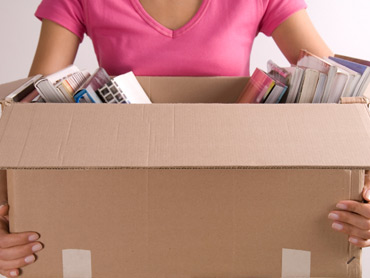Having too much stuff is not only an organizational headache, it can also impact your mental health. —Rose Caiola
What To Do
Don’t think of clutter as an enemy to be battled. In fighting mode, the body releases adrenaline, which causes a brief surge of energy followed by a hard crash. No wonder cleaning can be so exhausting; we often make ourselves stressed and tired just thinking about it! Changing your perspective about clutter will curb the fight response and keep stress at bay.
Now you’re ready to start decluttering. First, label two bags or boxes: one “donate” and the other “relocate.”
Next, set an intention for the room you are about to clear. Is it a room for relaxing? A space for spending time with family? Having a clear purpose will help you determine what stays and what goes. Look for items that do not fit your intention. Pick them up one by one and, with compassion, treat them as you would treat a lost child.
To objects that are relocating, say, “You have wandered into the wrong room. I know just where you belong.” To items to be donated, say, “You have wandered too far. My home is not the place for you, but I am sure we can find somewhere you belong.” Items that no longer serve a purpose for you or anyone else should be discarded. Because it can be difficult to throw things away, treat these items as party guests who have stayed a little too long. Say, “You’ve honored me with your presence. Thanks for coming over. No, you don’t need to stay to help clean up. Now, be safe out there, okay?”
Why To Do It
Studies have linked clutter with depression and lack of focus. Decluttering can improve your concentration and mood. The key is to declutter with compassion. “Our souls are not contained within our stuff,” said Lauren Rosenfeld, author of Breathing Room. “Nor is the meaning of our relationships or the importance of our shared history defined by our belongings.”
To find out about Rose’s thoughts on how to live a happier life, click here
Post Disclaimer
This content is for informational purposes only and does not constitute medical advice. Please consult a healthcare professional for any medical concerns.



